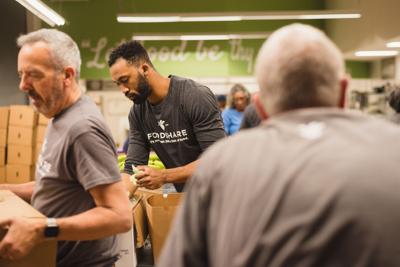Pet ownership is a big responsibility, and not everyone can devote the time and energy to caring for a pet full-time. It takes a village to raise or even foster a dog, and Kathleen Suggs found a way to be part of that village through Palmetto Animal Assisted Life Services (PAALS). When Suggs, a full-time paralegal and mother to a teenager, came across a mention of PAALS online early last year, she was thrilled to learn they were looking for weekend foster families for dogs.
“I immediately signed my son and I up for the weekend training class which you must complete,” says Suggs. “We both love dogs and my son has always had a special way with animals, so this was a perfect fit for us.”
Suggs and her son William, 15, look forward to weekends spent providing a temporary home to a foster dog, and tend to plan the weekend around the dog. Volunteering for PAALS as a weekend foster family allows Suggs to fit volunteering and spending time with a dog into her already full schedule. (She and William do have a full-time cat. The cat, unsurprisingly, does not enjoy dog weekends as much, but sometimes we make sacrifices to do the right thing, no?) Volunteering alongside family and friends is a valuable way to spend time together while working for the greater good.
April is National Volunteer Month, a nationwide effort to encourage volunteering and celebrate those who volunteer.
Most people want to volunteer, and many people do. But finding the time to help others in an already packed schedule can be daunting.
To highlight National Volunteer Month, the United Way of the Midlands’ hosts an annual Volunteer Week, offering would-be volunteers the opportunity to find gigs to fit any schedule. Volunteers can sign up for one-time projects on the United Way website (volunteer.uway.org/need) through Thursday, April 4. Projects are searchable by age of volunteer, agency, location, date, area of interest, accessibility, and several other categories.
Searching by area of interest is a valuable tool for a lot of people. Angela Marterer, whose brother lives with bipolar disorder, wanted to give back to an agency that offers help and support to other people living with mental illness. She chose the Mental Illness Recovery Center (MIRCI).
“I am not a mental health care professional, therefore not an authority on the subject, but having a mentally ill relative gives me insight on how it affects an entire family,” Marterer says. “I wanted to give back to those professionals that support the mentally ill, and MIRCI does that so well.”
When she reached out to MIRCI, they were happy to find a place for her, and let her decide what she could do and when. Now she can be found at MIRCI two or three mornings a week in their clothing closet. People in the community donate clothes, shoes, coats, and hats for men and women, and Marterer runs the shop.
“I like to think this is retail therapy,” Marterer says. “Clients can come in and ‘shop’ for clothing. I worked in retail for years so I try to make their experience like a true shopping trip. Clothes are color coordinated, and organized by size.”
Giving clients a more realistic shopping experience than they might find at a typical clothing bank makes use of Marterer’s skills and experience and provides a much-needed service for MIRCI’s clients.
Potential volunteers should keep in mind that most nonprofits welcome any help they can get, even an hour a week. There are opportunities for everyone, even those who prefer to work from home. Ask around, and you’re bound to find someone who needs a volunteer to send out fundraising letters, clean up files or field evening calls. Most nonprofits are on a tight budget and working to maximize limited resources. Nonprofit employees’ salaries are generally much lower than people with similar job responsibilities in other industries, and volunteers can make the difference between an agency continuing to serve people in need or closing down and leaving a void in the community.
Though volunteer efforts ultimately benefit the populations they serve, the act of volunteering is beneficial for those who do it. Any volunteer will tell you the work they do is personally rewarding. According to the Mayo Clinic, volunteering can reduce the risk of depression, teach skills, reduce stress, help the volunteer increase their own social circle, and possibly even help volunteers live longer. If you aren’t volunteering already, isn’t it time to start?







